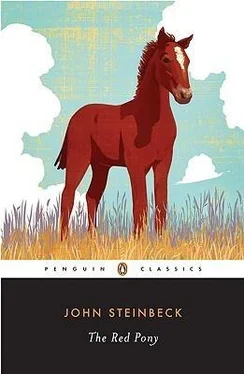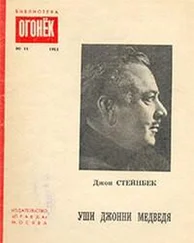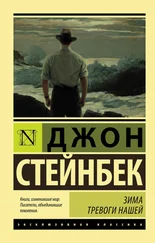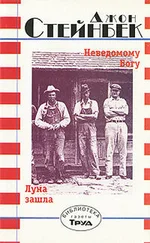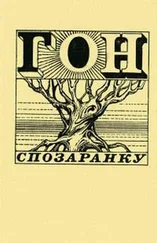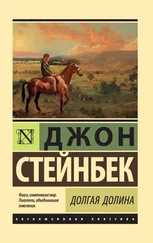Jody ran on toward the barn. Halfway there he heard the sound he dreaded, the hollow rasping cough of a horse. He broke into a sprint then. In the barn he found Billy Buck with the pony. Billy was rubbing its legs with his strong thick hands. He looked up and smiled gaily. “He just took a little cold,” Billy said. “We’ll have him out of it in a couple of days.”
Jody looked at the pony’s face. The eyes were half closed and the lids thick and dry. In the eye corners a crust of hard mucus stuck. Gabilan’s ears hung loosely sideways and his head was low. Jody put out his hand, but the pony did not move close to it. He coughed again and his whole body constricted with the effort. A little stream of thin fluid ran from his nostrils.
Jody looked back at Billy Buck. “He’s awful sick, Billy.”
“Just a little cold, like I said,” Billy insisted. “You go get some breakfast and then go back to school. I’ll take care of him.”
“But you might have to do something else. You might leave him.”
“No, I won’t. I won’t leave him at all. Tomorrow’s Saturday. Then you can stay with him all day.” Billy had failed again, and he felt badly about it. He had to cure the pony now.
Jody walked up to the house and took his place listlessly at the table. The eggs and bacon were cold and greasy, but he didn’t notice it. He ate his usual amount. He didn’t even ask to stay home from school. His mother pushed his hair back when she took his plate. “Billy’ll take care of the pony,” she assured him.
He moped through the whole day at school. He couldn’t answer any questions nor read any words. He couldn’t even tell anyone the pony was sick, for that might make him sicker. And when school was finally out he started home in dread. He walked slowly and let the other boys leave him. He wished he might continue walking and never arrive at the ranch.
Billy was in the barn, as he had promised, and the pony was worse. His eyes were almost closed now, and his breath whistled shrilly past an obstruction in his nose. A film covered that part of the eyes that was visible at all. It was doubtful whether the pony could see any more. Now and then he snorted, to clear his nose, and by the action seemed to plug it tighter. Jody looked dispiritedly at the pony’s coat. The hair lay rough and unkempt and seemed to have lost all of its old luster. Billy stood quietly beside the stall. Jody hated to ask, but he had to know.
“Billy, is he—is he going to get well?”
Billy put his fingers between the bars under the pony’s jaw and felt about. “Feel here,” he said and he guided Jody’s fingers to a large lump under the jaw. “When that gets bigger, I’ll open it up and then he’ll get better.”
Jody looked quickly away, for he had heard about that lump. “What is it the matter with him?”
Billy didn’t want to answer, but he had to. He couldn’t be wrong three times. “Strangles,” he said shortly, “but don’t you worry about that. I’ll pull him out of it. I’ve seen them get well when they were worse than Gabilan is. I’m going to steam him now. You can help.”
“Yes,” Jody said miserably. He followed Billy into the grain room and watched him make the steaming bag ready. It was a long canvas nose bag with straps to go over a horse’s ears. Billy filled it one-third full of bran and then he added a couple of handfuls of dried hops. On top of the dry substance he poured a little carbolic acid and a little turpentine. “I’ll be mixing it all up while you run to the house for a kettle of boiling water,” Billy said.
When Jody came back with the steaming kettle, Billy buckled the straps over Gabilan’s head and fitted the bag tightly around his nose. Then through a little hole in the side of the bag he poured the boiling water on the mixture. The pony started away as a cloud of strong steam rose up, but then the soothing fumes crept through his nose and into his lungs, and the sharp steam began to clear out the nasal passages. He breathed loudly. His legs trembled in an ague, and his eyes closed against the biting cloud. Billy poured in more water and kept the steam rising for fifteen minutes. At last he set down the kettle and took the bag from Gabilan’s nose. The pony looked better. He breathed freely, and his eyes were open wider than they had been.
“See how good it makes him feel,” Billy said. “Now we’ll wrap him up in the blanket again. Maybe he’ll be nearly well by morning.”
“I’ll stay with him tonight,” Jody suggested.
“No. Don’t you do it. I’ll bring my blankets down here and put them in the hay. You can stay tomorrow and steam him if he needs it.”
The evening was falling when they went to the house for their supper. Jody didn’t even realize that some one else had fed the chickens and filled the wood-box. He walked up past the house to the dark brush line and took a drink of water from the tub. The spring water was so cold that it stung his mouth and drove a shiver through him. The sky above the hills was still light. He saw a hawk flying so high that it caught the sun on its breast and shone like a spark. Two blackbirds were driving him down the sky, glittering as they attacked their enemy. In the west, the clouds were moving in to rain again.
Jody’s father didn’t speak at all while the family ate supper, but after Billy Buck had taken his blankets and gone to sleep in the barn, Carl Tiflin built a high fire in the fireplace and told stories. He told about the wild man who ran naked through the country and had a tail and ears like a horse, and he told about the rabbit-cats of Moro Cojo that hopped into the trees for birds. He revived the famous Maxwell brothers who found a vein of gold and hid the traces of it so carefully that they could never find it again.
Jody sat with his chin in his hands; his mouth worked nervously, and his father gradually became aware that he wasn’t listening very carefully. “Isn’t that funny?” he asked.
Jody laughed politely and said, “Yes, sir.” His father was angry and hurt, then. He didn’t tell any more stories. After a while, Jody took a lantern and went down to the barn. Billy Buck was asleep in the hay, and, except that his breath rasped a little in his lungs, the pony seemed to be much better. Jody stayed a little while, running his fingers over the red rough coat, and then he took up the lantern and went back to the house. When he was in bed, his mother came into the room.
“Have you enough covers on? It’s getting winter.”
“Yes, ma’am.”
“Well, get some rest tonight.” She hesitated to go out, stood uncertainly. “The pony will be all right,” she said.
Jody was tired. He went to sleep quickly and didn’t awaken until dawn. The triangle sounded, and Billy Buck came up from the barn before Jody could get out of the house.
“How is he?” Jody demanded.
Billy always wolfed his breakfast. “Pretty good. I’m going to open that lump this morning. Then he’ll be better maybe.”
After breakfast, Billy got out his best knife, one with a needle point. He whetted the shining blade a long time on a little carborundum stone. He tried the point and the blade again and again on his callused thumb-ball, and at last he tried it on his upper lip.
On the way to the barn, Jody noticed how the young grass was up and how the stubble was melting day by day into the new green crop of volunteer. It was a cold sunny morning.
As soon as he saw the pony, Jody knew he was worse. His eyes were closed and sealed shut with dried mucus. His head hung so low that his nose almost touched the straw of his bed. There was a little groan in each breath, a deep-seated, patient groan.
Billy lifted the weak head and made a quick slash with the knife. Jody saw the yellow pus run out. He held up the head while Billy swabbed out the wound with weak carbolic acid salve.
Читать дальше
